
About this Event
Plan for Creating Awareness and Securing Accommodation for Reparation Discussions at the Embassy
The goal of this plan is to orchestrate a series of organized, respectful, and impactful actions aimed at convincing the embassy to provide regular accommodation for reparation discussion meetings. These meetings are essential for advancing the mission of the African Diaspora Equity and Justice Alliance (ADEJA) and fostering dialogue around historical reparatory justice. This document outlines the detailed plan, provides background information about ADEJA, and equips ticket holders with the necessary information and tools to participate effectively in this initiative.
Mission of ADEJA
The African Diaspora Equity and Justice Alliance (ADEJA) aims to advance the well-being, empowerment, unity, and pursuit of historical reparatory justice for Black Africans, the Black African diaspora, and the Mixed-Black diaspora. ADEJA operates on an evidence-based claim-by-claim basis, seeking to address historical inequities and promote shared prosperity.
Core Principles
- Equity and Justice: ADEJA is committed to achieving fairness and justice for Black communities through structured and evidence-based reparation claims.
- Empowerment: The initiative focuses on empowering Black individuals and communities, fostering unity and collective action.
- Cultural Restoration: ADEJA values the preservation and restoration of cultural identity, recognizing both tradeable and non-tradeable assets in reparation efforts.
- Alignment with National Interests: ADEJA works in alignment with the UK government to support national security, promote racial equality, and enhance the UK's global leadership in human rights.
Objective
The primary objective of this plan is to persuade the embassy to provide regular accommodation for reparation discussion meetings. This includes securing a meeting room, seating, and refreshments for attendees.
Strategy
- Organized Presentations: Attendees will present tickets and letters to embassy staff, formally requesting accommodation for discussion meetings.
- Critical Mass Approach: It is expected that initial requests may be declined, but as more attendees present their tickets and letters, the cumulative impact will increase the likelihood of securing accommodation.
- Continuous Engagement: This initiative will involve continuous engagement and presentations until the embassy acknowledges the need for and provides accommodation.
Step 1: Preparation
- Create Tickets and Letters: Design and print tickets and letters that attendees will present to embassy staff.
- Educate Participants: Provide thorough information to participants about ADEJA, the purpose of their visit, and the importance of their role in the initiative.
Step 2: Initial Engagement
- First Group of Attendees: Organize the first group of attendees to visit the embassy and present their tickets and letters.
- Record Responses: Document the embassy's response to the initial group to understand their stance and prepare for subsequent actions.
Step 3: Building Momentum
- Increase Participation: Mobilize more attendees to visit the embassy, ensuring a steady stream of requests.
- Media Coverage: Engage with media outlets to cover the initiative, highlighting the importance of reparatory justice and the embassy's role.
Step 4: Continuous Pressure
- Regular Visits: Maintain regular visits by attendees, each presenting their ticket and letter.
- Collective Representation: As the number of requests grows, present a collective summary to the embassy, emphasizing the community's unified demand.
Step 5: Negotiation and Accommodation
- Formal Negotiation: If the embassy indicates willingness to discuss, organize a formal negotiation team to outline specific requirements for accommodation.
- Implementation of Meetings: Once accommodation is secured, begin regular reparation discussion meetings at the embassy.
Background on ADEJA
The African Diaspora Equity and Justice Alliance (ADEJA) is a movement financed by Reparation Nation Limited. ADEJA's mission is to advance reparatory justice for Black Africans, the Black African diaspora, and the Mixed-Black diaspora.
What Ticket Holders Should Know
- Purpose: The purpose of presenting tickets and letters is to request the embassy's accommodation for regular discussion meetings on reparatory justice.
- Process: Attendees will present their ticket and letter to embassy staff at the entrance. It is important to remain respectful and articulate the purpose clearly.
- Expected Outcome: Initially, accommodation may not be provided. The goal is to create awareness and build a critical mass of requests to convince the embassy of the importance of these meetings.
- Support: ADEJA will provide support and guidance throughout the process. Participants are encouraged to document their experiences and feedback.
[Participant's Name]
[Participant's Address]
[Post Code]
[Email Address]
[Phone Number]
[Date]
To the Embassy Staff,
I am writing to formally request the accommodation of regular discussion meetings at the embassy. These meetings are crucial for advancing the mission of the African Diaspora Equity and Justice Alliance (ADEJA), which seeks to address historical reparatory justice for Black Africans, the Black African diaspora, and the Mixed-Black diaspora.
The ADEJA movement, financed by Reparation Nation Limited, is committed to fostering dialogue and taking evidence-based actions towards reparations. Providing a space for these discussions will greatly contribute to our collective efforts in achieving equity, justice, and empowerment for our communities.
I understand that my request may not be accommodated immediately. However, I hope that the presentation of this letter, along with similar requests from other participants, will highlight the significance of our cause and the need for a dedicated space for these important discussions.
Thank you for your time and consideration.
Sincerely,
[Participant's Name]
The success of this initiative depends on the collective effort and persistence of all participants. By presenting tickets and letters, we aim to create a powerful and unified voice that the embassy cannot ignore. This plan outlines a structured approach to achieving our goal of securing regular accommodation for reparation discussion meetings, which is a crucial step towards advancing ADEJA's mission of historical reparatory justice.
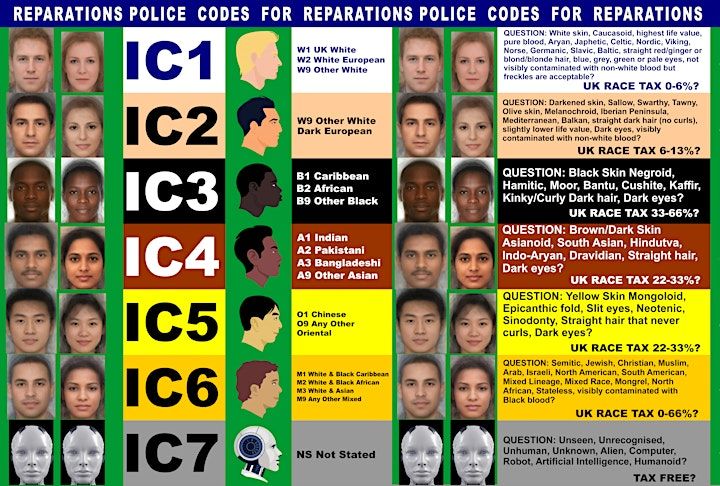
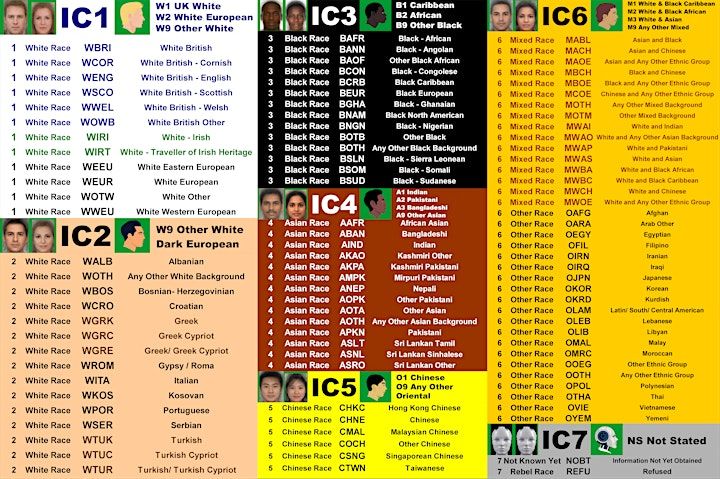
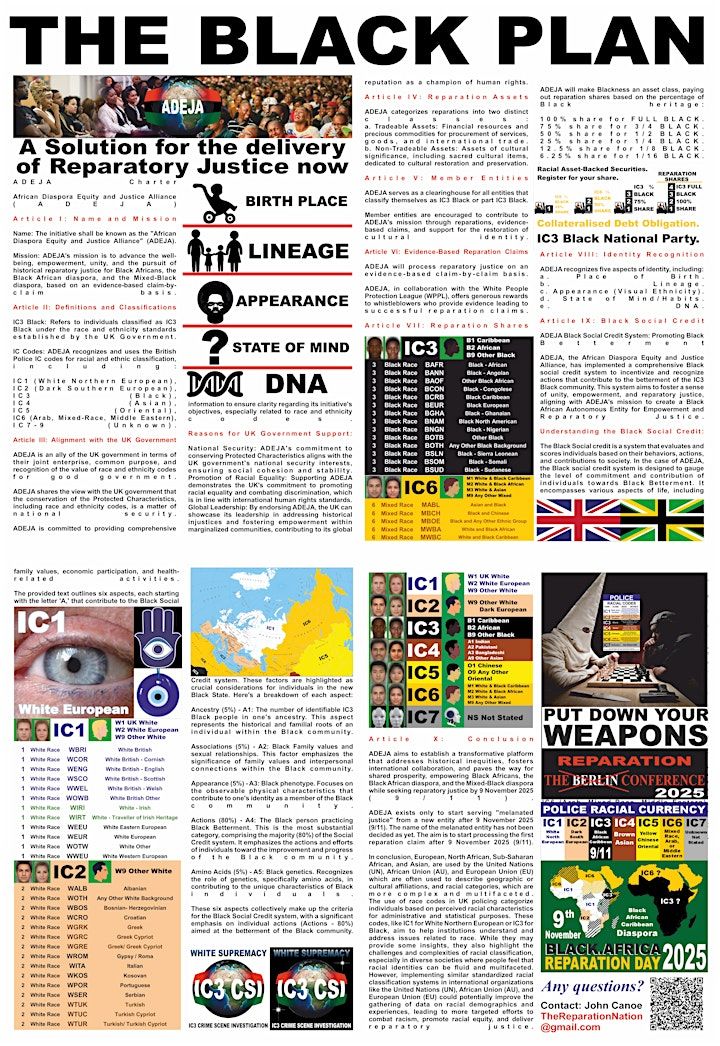
African Diaspora Equity and Justice Alliance (ADEJA)
Article I: Name and Mission
Name: The initiative shall be known as the "African Diaspora Equity and Justice Alliance" (ADEJA).
Mission: ADEJA's mission is to advance the well-being, empowerment, unity, and the pursuit of historical reparatory justice for Black Africans, the Black African diaspora, and the Mixed-Black diaspora, based on an evidence-based claim-by-claim basis.
Article II: Definitions and Classifications
IC3 Black: Refers to individuals classified as IC3 Black under the race and ethnicity standards established by the UK Government.
IC Codes: ADEJA recognizes and uses the British Police IC codes for racial and ethnic classification, including:
IC1 (White Northern European),
IC2 (Dark Southern European),
IC3 (Black),
IC4 (Asian),
IC5 (Oriental),
IC6 (Arab, Mixed-Race, Middle Eastern),
IC7-9 (Unknown).
Article III: Alignment with the UK Government
ADEJA is an ally of the UK government in terms of their joint enterprise, common purpose, and recognition of the value of race and ethnicity codes for good government.
ADEJA shares the view with the UK government that the conservation of the Protected Characteristics, including race and ethnicity codes, is a matter of national security.
ADEJA is committed to providing comprehensive information to ensure clarity regarding its initiative's objectives, especially related to race and ethnicity codes.
Reasons for UK Government Support:
National Security: ADEJA's commitment to conserving Protected Characteristics aligns with the UK government's national security interests, ensuring social cohesion and stability.
Promotion of Racial Equality: Supporting ADEJA demonstrates the UK's commitment to promoting racial equality and combating discrimination, which is in line with international human rights standards.
Global Leadership: By endorsing ADEJA, the UK can showcase its leadership in addressing historical injustices and fostering empowerment within marginalized communities, contributing to its global reputation as a champion of human rights.
Article IV: Reparation Assets
ADEJA categorizes reparations into two distinct classes:
a. Tradeable Assets: Financial resources and precious commodities for procurement of services, goods, and international trade.
b. Non-Tradeable Assets: Assets of cultural significance, including sacred cultural items, dedicated to cultural restoration and preservation.
Article V: Member Entities
ADEJA serves as a clearinghouse for all entities that classify themselves as IC3 Black or part IC3 Black.
Member entities are encouraged to contribute to ADEJA's mission through reparations, evidence-based claims, and support for the restoration of cultural identity.
Article VI: Evidence-Based Reparation Claims
ADEJA will process reparatory justice on an evidence-based claim-by-claim basis.
ADEJA, in collaboration with the White People Protection League (WPPL), offers generous rewards to whistleblowers who provide evidence leading to successful reparation claims.
Article VII: Reparation Shares
ADEJA will make Blackness an asset class, paying out reparation shares based on the percentage of Black heritage:
100% share for FULL BLACK.
75% share for 3/4 BLACK.
50% share for 1/2 BLACK.
25% share for 1/4 BLACK.
12.5% share for 1/8 BLACK.
6.25% share for 1/16 BLACK.
Article VIII: Identity Recognition
ADEJA recognizes five aspects of identity, including:
a. Place of Birth.
b. Lineage.
c. Appearance (Visual Ethnicity).
d. State of Mind/Habits.
e. DNA.
Article IX: Black Social Credit
ADEJA Black Social Credit System: Promoting Black Betterment
ADEJA, the African Diaspora Equity and Justice Alliance, has implemented a comprehensive Black social credit system to incentivize and recognize actions that contribute to the betterment of the IC3 Black community. This system aims to foster a sense of unity, empowerment, and reparatory justice, aligning with ADEJA's mission to create a Black African Autonomous Entity for Empowerment and Reparatory Justice.
Understanding the Black Social Credit:
The Black Social credit is a system that evaluates and scores individuals based on their behaviors, actions, and contributions to society. In the case of ADEJA, the Black social credit system is designed to gauge the level of commitment and contribution of individuals towards Black Betterment. It encompasses various aspects of life, including family values, economic participation, and health-related activities.
The provided text outlines six aspects, each starting with the letter 'A,' that contribute to the Black Social Credit system. These factors are highlighted as crucial considerations for individuals in the new Black State. Here's a breakdown of each aspect:
Ancestry (5%) - A1: The number of identifiable IC3 Black people in one's ancestry. This aspect represents the historical and familial roots of an individual within the Black community.
Associations (5%) - A2: Black Family values and sexual relationships. This factor emphasizes the significance of family values and interpersonal connections within the Black community.
Appearance (5%) - A3: Black phenotype. Focuses on the observable physical characteristics that contribute to one's identity as a member of the Black community.
Actions (80%) - A4: The Black person practicing Black Betterment. This is the most substantial category, comprising the majority (80%) of the Social Credit system. It emphasizes the actions and efforts of individuals toward the improvement and progress of the Black community.
Amino Acids (5%) - A5: Black genetics. Recognizes the role of genetics, specifically amino acids, in contributing to the unique characteristics of Black individuals.
These six aspects collectively make up the criteria for the Black Social Credit system, with a significant emphasis on individual actions (Actions - 80%) aimed at the betterment of the Black community.
Article X: Conclusion
ADEJA aims to establish a transformative platform that addresses historical inequities, fosters international collaboration, and paves the way for shared prosperity, empowering Black Africans, the Black African diaspora, and the Mixed-Black diaspora while seeking reparatory justice by 9 November 2025 (9/11).
ADEJA exists only to start serving "melanated justice" from a new entity after 9 November 2025 (9/11). The name of the melanated entity has not been decided as yet. The aim is to start processing the first reparation claim after 9 November 2025 (9/11).
In conclusion, European, North African, Sub-Saharan African, and Asian, are used by the United Nations (UN), African Union (AU), and European Union (EU) which are often used to describe geographic or cultural affiliations, and racial categories, which are more complex and multifaceted.
The use of race codes in UK policing categorize individuals based on perceived racial characteristics for administrative and statistical purposes. These codes, like IC1 for White Northern European or IC3 for Black, aim to help institutions understand and address issues related to race. While they may provide some insights, they also highlight the challenges and complexities of racial classification, especially in diverse societies where people feel that racial identities can be fluid and multifaceted. However, implementing similar standardized racial classification systems in international organizations like the United Nations (UN), African Union (AU), and European Union (EU) could potentially improve the gathering of data on racial demographics and experiences, leading to more targeted efforts to combat racism, promote racial equity, and deliver reparatory justice.
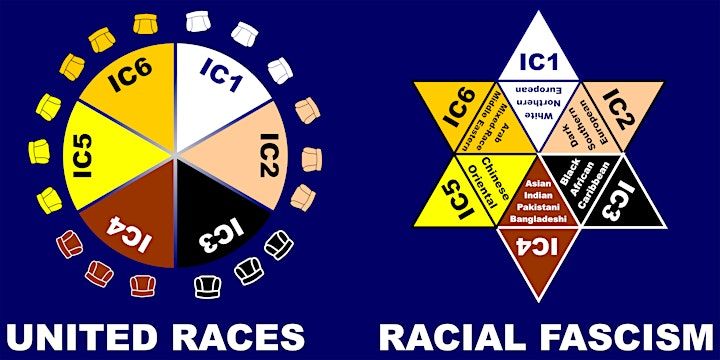
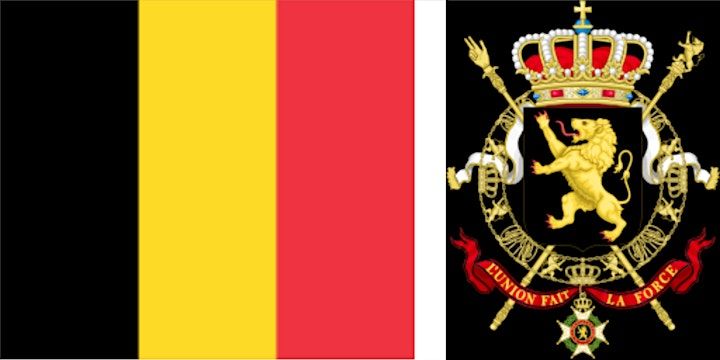
Event Venue & Nearby Stays
Belgian Embassy, Belgian Embassy, Riyadh, Saudi Arabia
GBP 0.00
